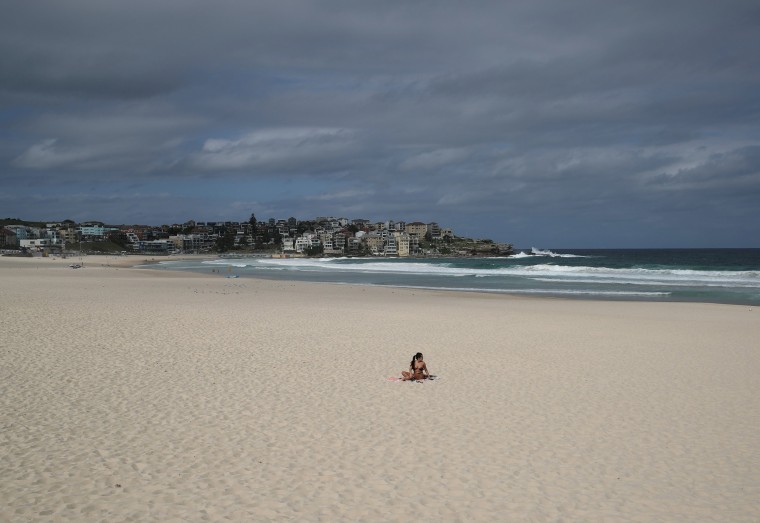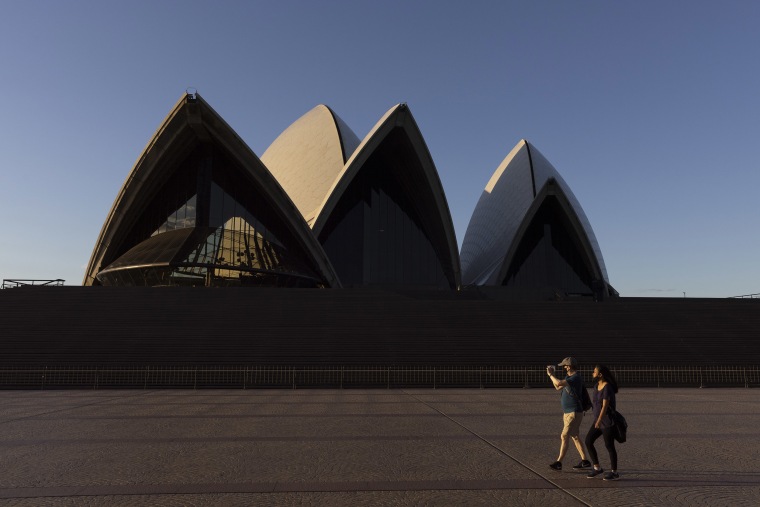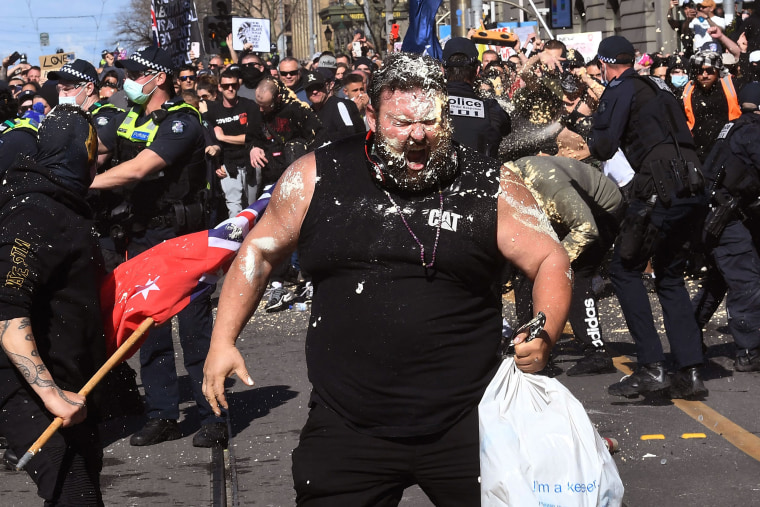SYDNEY — You would have forgiven Australians for feeling smug during much of the Covid-19 pandemic.
Early lockdowns combined with extremely strict border measures meant the coronavirus was effectively snuffed out, and, except for one state, the country had been largely Covid-free since mid-2020.
As case numbers and death tolls skyrocketed around the globe, the majority of Australians enjoyed near-normal lives, packing restaurants, beaches and festivals inside what was dubbed "fortress Australia."
But then, in June, one case of the delta variant breached the fortress walls and started an outbreak that couldn't be controlled.
With the highly infectious variant now seeping around the country, more than half of Australia's 25 million people are in lockdown, and a slow vaccination program has left many demanding to know what went wrong.
For a time, "we were in a bit of a Covid-free paradise," said Michael Toole, a professor at the Burnet Institute, a medical research center. "And I think it led to a level of complacency, both within the government and among the public. ... Now, it's all a mess."
'Game changer'
At the start of the pandemic, Australia locked down its population and then slammed shut the borders, allowing only a trickle of people back in, with mandatory 14-day quarantine periods in repurposed hotels or government facilities.

When Covid cases leaked, states used forensic contact tracing or quick lockdowns — or both — to suppress the virus. Life would quickly return to normal — the big exception being Melbourne, which controlled only one outbreak with a 3½-month lockdown last year.
Then, in June, one case of the delta variant changed everything. An unvaccinated and unmasked driver in Sydney became infected after having transported international flight crews. Before long, the virus was spreading in his neighborhood and beyond.
Contact tracing and a Sydney-wide lockdown were used, but cases started to climb and then began popping up elsewhere around the country. Within weeks, almost all major cities had some sort of lockdown, with various levels of success in taming the virus.
Meanwhile, just a single delta case that originated in the Australian outbreak has also plunged the whole of neighboring New Zealand into lockdown.
The lockdown in Sydney, which was supposed to be two weeks, is in its ninth week. In the hardest-hit areas of the city, army personnel have been deployed, and fines for breaking certain rules have risen to $3,700.
The state of New South Wales, of which Sydney is the capital, has gone from recording dozens of cases every day early in the outbreak to more than 800 cases and several deaths every day.
While that is dramatically less than in the U.S. — which is still recording upward of 100,000 cases and hundreds of deaths every day — the numbers were unthinkable in Australia just weeks ago.
"We have to accept that this is the worst situation New South Wales has been in since Day One," New South Wales Premier Gladys Berejiklian recently told reporters. "And it's also, regrettably, because of that the worst situation Australia's been in."

Or as the state's chief health officer, Kerry Chant, put it earlier, the delta strain is "a game changer."
Toole said the delta variant "is twice as infectious as earlier strains, so it's obviously more challenging."
Toole is part of a group of health experts calling for even harsher lockdown measures to contain the more infectious variant — particularly in the center of the outbreak, Sydney, where case numbers keep rising — including closing far more businesses.
Australia's second-largest city, Melbourne, has fewer cases but a much stricter lockdown — with a citywide curfew, closed playgrounds and more shuttered businesses. Even so, there are still dozens of new cases every day.
Balancing health and economic priorities has proved a tightrope walk for leaders; economists say the latest rounds of lockdowns has cost around $12.5 billion.
While unemployment remains low, there is concern that continued lockdowns could push the country into its second recession of the pandemic. Australian Treasurer Josh Frydenberg predicted Thursday that the economy will contract by at least 2 percent in the September quarter.
A spokesperson for Australia's health minister, Greg Hunt, told NBC News that "the delta variant of Covid-19 is a global challenge not just faced by Australia, but we continue to work together to meet this challenge head on."
But making it all the more challenging is Australia's vaccination rate, which is lagging behind the rates in many other comparable countries.
'It's not a race'
Australia's initial success meant it didn't pursue vaccines with the urgency and strategy of some other countries, as Prime Minister Scott Morrison (now infamously) claimed it was "not a race."
The rollout started in February, with the locally made AstraZeneca vaccine as the main component, followed by limited supplies of the Pfizer vaccine from overseas.
It has since been marked by vaccine shortages and community confusion around the AstraZeneca vaccine.
After it emerged that AstraZeneca's vaccine had an extremely rare blood-clotting risk, local health authorities recommended that it be given only to people over age 60. But they backpedaled on the advice after the latest outbreak.

The government "put too many eggs in one basket, mostly relying on AstraZeneca, because we could make it locally," said Archie Clements, a professor of infectious disease epidemiology at Curtin University. "Then there was inconsistent messaging around it ... when it's a very effective and very safe vaccine."
As a result of the early stumbles, 30 percent of Australians ages 16 and above have been fully vaccinated, compared to 62 percent in the U.S. ages 18 and above.
For much of the year, Australia had the lowest vaccination rate as a percentage of population in the Organization for Economic Cooperation and Development, and it is currently ranked 35th of 38 countries.
The rollout ended up being "a huge policy and operational bungle," Toole said.
And there is alarm as the latest outbreak is spreading to remote Aboriginal communities, where vaccination rates are particularly low.
Australia's Aboriginal people were a priority group for vaccination, but in one remote area where delta is now present, only 8 percent of the population has been fully vaccinated.
"This is absolute negligence," Toole said.
Just how bad is it?
The government has set vaccination thresholds of 70 percent and 80 percent for a staged return to normal life, which isn't likely to be achieved until much later this year.
But the rollout is starting to pick up pace, with 1.8 million vaccine shots administered over the past week, meaning more than half of the eligible population has now received their first doses.
"On a per capita basis, that's on par with the best ever week in the United States and better than the best ever week in the United Kingdom," Morrison said Monday.
Toole said the rollout will escalate even more later in the year, "because we've ordered a lot more Pfizer and a lot of Moderna vaccines."
Clements said that despite the latest outbreak and the accompanying lockdowns, the world should still be envious of Australia.
"This outbreak, we haven't seen the massive levels of mortality and the collapse of health systems that have happened in other countries. So we're still in a privileged position," he said.
Over the entire pandemic, there have been about 44,000 Covid-19 cases and just under 1,000 deaths in Australia. That compares to upward of 37.5 million cases and 628,000 deaths in the U.S.
"So we're still doing incredibly well," Clements said.